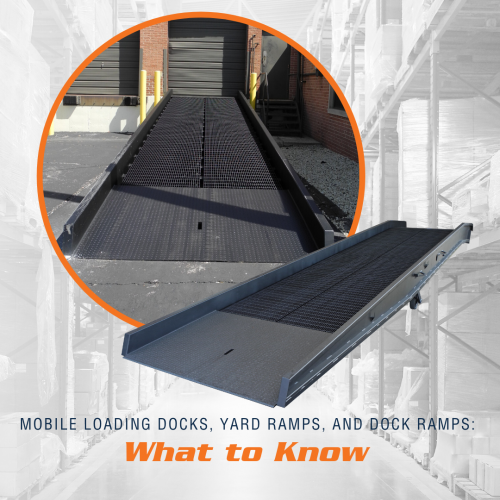We use cookies to make your experience better. To comply with the new e-Privacy directive, we need to ask for your consent to set the cookies. Learn more.
Mobile Loading Docks, Yard Ramps, and Dock Ramps: What to Know

Of course, the proper dock equipment varies with the needs of the individual business, and evaluating the features and capabilities of different options can be difficult at first. That’s especially true when choosing loading ramps.
Here's a quick overview of the most commonly accepted industry terminology: Permanent dock ramps assist in loading and unloading when vehicles regularly dock at a single location. Mobile loading docks and yard ramps serve a similar function, but they can be moved to different areas of a warehouse or worksite.
To determine what type of equipment will work best for your operation, let’s take a closer look at the differences between the terms:
- Dock Ramps - Dock ramps are permanent or semi-permanent structures designed for dock-to-ground loading and unloading. While dock ramps can be moved, that’s not a simple process, as they’re typically anchored to the ground to ensure security. They’re durable, reliable, and designed to provide a permanent loading point at a business’s dock doors.
For example, the BHS Dock Ramp (DR) is constructed from solid steel and is available in 16,000-pound and 20,000-pound capacities, both of which feature a steel approach plate and steel grating for improved traction. Designed for standard-height loading docks, the BHS-DR is secured with two anchors at its base.
- Mobile Loading Dock Ramps - Designed for ground-to-truck loading and unloading, yard ramps — sometimes referred to as portable loading dock ramps or mobile loading dock ramps — can be moved easily with a lift truck. They’re extremely useful when loading does not occur at a particular point on a worksite, and add versatility to a business’s logistics infrastructure.
We should note here that while some suppliers use the terms “mobile loading dock ramp" and “yard ramp" interchangeably, the products’ features and capabilities can vary significantly. In general, a yard ramp is intended to connect directly to a truck to allow for easy loading/unloading. Much of the weight of the load is transferred to the truck’s suspension. Some mobile loading docks are freestanding and capable of bearing the entire load (as a result, they’re much less portable than typical yard ramps, and they’re more similar to traditional dock ramps).
For the vast majority of operations, yard ramps are an ideal option for truly mobile loading. The BHS Yard Ramp (YR) is a 36-foot ramp with a hydraulic hand pump, which allows workers to control the height. Two solid tires add to the portability, and an optional tow bar can hitch the ramp to a lift truck to move it throughout a facility.
Mobile Loading Dock Ramps Add Flexibility
So, what option makes sense for your business? Consider where workers load, whether your facility is likely to change significantly, and whether you could benefit from a more versatile approach.
Businesses can use yard ramps to unload trucks when a main dock is occupied, set up a makeshift receive point with appropriate loading platforms, or handle other atypical situations with ease. For example, a business that experiences a larger-than-average workload during the holiday season might be able to use mobile loading dock ramps to handle multiple deliveries easily.
By the same token, dock ramps provide better efficiency at a business’s primary dock. They’re essential for facilities with established loading procedures, but many operations can complement their permanent or semi-permanent docks with mobile solutions. When workers need more flexibility, mobile loading docks like the BHS Yard Ramp (YR) can fill in the gaps (literally), ensuring efficiency, safety, and full compliance with OSHA standards 1910.178.
To put that another way, yard ramps are useful at any facility that relies on lift trucks, regardless of whether that facility has an established dock point. Whatever you call them — yard ramps, mobile loading dock ramps, or portable dock ramps — they’re extraordinarily helpful for loading and unloading safely in a variety of environments.
For additional guidance on choosing dock equipment, call 1.800.BHS.9500 to speak to our sales team.
